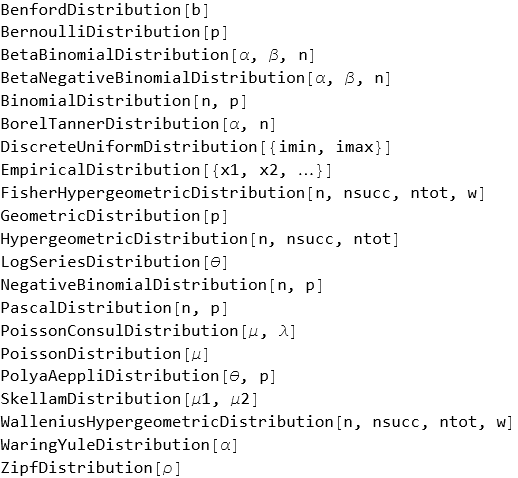I am trying to get all Discrete Univariate Distributions with symbolic arguments from any place in Wolfram Language system. For example this guide:
http://reference.wolfram.com/language/guide/DiscreteUnivariateDistributions.html
or maybe some information in WolframLanguageData. The final form of output should be a list
{ZipfDistribution[ρ], ZipfDistribution[n,ρ], LogSeriesDistribution[θ], ...etc.}
giving complete set of all Discrete Univariate Distributions. Perhaps this might be useful, but this mixes in continuous distributions which I do not need and it also does not give symbolic arguments:
EntityList[
EntityClass["WolframLanguageSymbol",
{"FunctionalityAreas"->EqualTo[{"StatisticalDistributionSymbols"}]}]]
This might be useful too:
Entity["WolframLanguageSymbol", "ZipfDistribution"]["PlaintextUsage"]
Entity["WolframLanguageSymbol", "ZipfDistribution"]["TypesetUsage"]
- ZipfDistribution[ρ] represents a zeta distribution with parameter ρ.
- ZipfDistribution[n, ρ] represents a Zipf distribution with range n.


DistributionDomainwill help.DistributionDomain[ZipfDistribution[\[Rho]]]results in1 ;; \[Infinity]andDistributionDomain[NormalDistribution[]]results inInterval[{-\[Infinity], \[Infinity]}]. $\endgroup$?StatisticsLibrary*) finds a function namedDiscreteDistributionQ` but I can't get it to work. (Nor can I get the previous text to format properly.) $\endgroup$